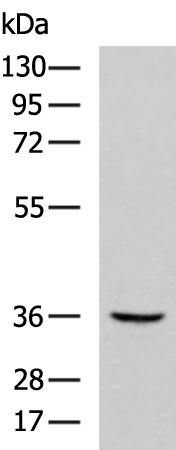
| WB | 咨询技术 | Human,Mouse,Rat |
| IF | 咨询技术 | Human,Mouse,Rat |
| IHC | 咨询技术 | Human,Mouse,Rat |
| ICC | 技术咨询 | Human,Mouse,Rat |
| FCM | 咨询技术 | Human,Mouse,Rat |
| Elisa | 1/5000-1/10000 | Human,Mouse,Rat |
| WB Predicted band size | 38 kDa |
| Host/Isotype | Rabbit IgG |
| Antibody Type | Primary antibody |
| Storage | Store at 4°C short term. Aliquot and store at -20°C long term. Avoid freeze/thaw cycles. |
| Species Reactivity | Human, Mouse, Rat |
| Immunogen | Synthetic peptide of human ABHD6 |
| Formulation | Purified antibody in PBS with 0.05% sodium azide and 50% glycerol. |
+ +
以下是关于ABHD6抗体的3篇代表性文献的简要总结:
---
1. **文献名称**: *"Selective blockade of the lysophosphatidylinositol transporter ABHD6 protects against ischemic brain injury"*
**作者**: Li et al. (2020)
**摘要**: 该研究开发了一种特异性靶向ABHD6的单克隆抗体,发现其通过抑制ABHD6介导的溶血磷脂酰肌醇(LPI)代谢,减少缺血性脑损伤中的神经炎症反应,为中风治疗提供潜在靶点。
---
2. **文献名称**: *"ABHD6 regulates anxiety and stress responses through hydrolysis of endocannabinoids in the amygdala"*
**作者**: Marrs et al. (2019)
**摘要**: 利用ABHD6抗体进行组织定位研究,发现ABHD6在杏仁核中高表达,并通过水解2-花生四烯酸甘油酯(2-AG)调控内源性大麻素系统,影响焦虑和应激行为。
---
3. **文献名称**: *"Antibody-based profiling of brain lipid hydrolases in human obesity"*
**作者**: Thomas et al. (2018)
**摘要**: 研究采用多种ABHD6抗体分析人脑组织样本,发现肥胖患者前额叶皮层中ABHD6蛋白水平显著上调,提示其可能通过脂质代谢紊乱参与肥胖相关神经病理过程。
---
如需具体文献链接或补充更多研究,可进一步说明。
ABHD6 (α/β-hydrolase domain-containing 6) is a serine hydrolase enzyme involved in lipid metabolism, particularly in regulating endocannabinoid signaling. It hydrolyzes 2-arachidonoylglycerol (2-AG), a major endogenous cannabinoid, modulating its availability for cannabinoid receptors. ABHD6 is also implicated in glycerophospholipid metabolism and interacts with pathways linked to energy homeostasis, inflammation, and neurological function. Its dual localization in the brain (neurons, astrocytes) and peripheral tissues underscores its diverse physiological roles. Dysregulation of ABHD6 has been associated with metabolic disorders, neurodegenerative diseases, and cancer.
ABHD6 antibodies are essential tools for studying its expression, localization, and function. These antibodies are widely used in techniques like Western blotting, immunohistochemistry (IHC), and immunofluorescence to detect ABHD6 in tissue samples or cell lines. Specificity is validated through knockout controls or siRNA silencing. Research applications include investigating ABHD6's role in endocannabinoid signaling, lipid metabolism in metabolic syndromes, and its potential as a therapeutic target in epilepsy or neuroinflammation. Some antibodies distinguish ABHD6 from structurally similar enzymes (e.g., ABHD12) to avoid cross-reactivity. Commercial ABHD6 antibodies vary in clonality (monoclonal/polyclonal) and epitope targets, requiring optimization for experimental conditions. Their development has advanced understanding of ABHD6's pathophysiological contributions, supporting drug discovery and mechanistic studies in metabolic and neurological diseases.
×